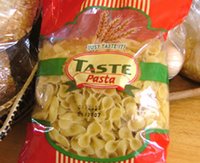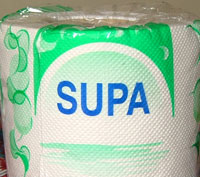Supa Good Product: A Carnival of Commerce
'Lost in Translation' Brand Names
Witnessing international trade in action is an amusing experience in Africa. Because Rwanda produces few consumer goods on its own, its economy is dependent on imports from all over the world. Grocery shopping, then, becomes a globalized process. Labels are crowded with translations in as many as five languages. Canned corn imported from a Saudi Arabian distributor sits on the shelf next to canned corn that was grown in the United States but distributed through a Jordanian company. Four steps can take you to four continents: tinned ham from India, powdered milk from Kenya, Chinese soy sauce with a French label, and biscuits from Germany.
Names and slogans are often lost in translation, morphing into the pedestrian (if a company wants to be safe), the bizarre (if the company wants to show some personality), or the blatantly incorrect (if the company did not do any research).
 Most commonly, product names are remarkable for being so unremarkable. Fresh Product Tissues and Taste Pasta are prime examples of when companies want to express their dedication to building consumer confidence but end up with labels that sound like primary school projects. Tissues do not necessarily need to be fresh. In fact, the trees have been dead for quite some time before the boxes reach the store. Taste is not the most exciting name for a pasta brand. To make matters worse, its catchy slogan is "Just Taste It!" This strikes me as an oddly aggressive command for peaceful food shoppers.
Most commonly, product names are remarkable for being so unremarkable. Fresh Product Tissues and Taste Pasta are prime examples of when companies want to express their dedication to building consumer confidence but end up with labels that sound like primary school projects. Tissues do not necessarily need to be fresh. In fact, the trees have been dead for quite some time before the boxes reach the store. Taste is not the most exciting name for a pasta brand. To make matters worse, its catchy slogan is "Just Taste It!" This strikes me as an oddly aggressive command for peaceful food shoppers.

Supa toilet paper mystifies me. I am not sure yet if the name deliberately plays on super, insinuating that the quality of the paper is high, or if it is an honest misspelling.
Some product names use associations erroneously. Spot is a brand of bleach-based bathroom cleaner. Clearly, the company means that their product removes spots; but the name suggests their presence more than their absence.

Ultimately, these examples have ESL problems at their roots. Developing businesses often have a limited English vocabulary. Like many desperate students, they fall back on what they already know: the familiar lingo of English marketing, the universal language of money. But to those who already bridle at the forced saturation of advertising in the West, it comes off as childish imitation.
And for those of us who are delighted by the surreal: it's pure entertainment, courtesy of the free market.
Witnessing international trade in action is an amusing experience in Africa. Because Rwanda produces few consumer goods on its own, its economy is dependent on imports from all over the world. Grocery shopping, then, becomes a globalized process. Labels are crowded with translations in as many as five languages. Canned corn imported from a Saudi Arabian distributor sits on the shelf next to canned corn that was grown in the United States but distributed through a Jordanian company. Four steps can take you to four continents: tinned ham from India, powdered milk from Kenya, Chinese soy sauce with a French label, and biscuits from Germany.
Names and slogans are often lost in translation, morphing into the pedestrian (if a company wants to be safe), the bizarre (if the company wants to show some personality), or the blatantly incorrect (if the company did not do any research).
 Most commonly, product names are remarkable for being so unremarkable. Fresh Product Tissues and Taste Pasta are prime examples of when companies want to express their dedication to building consumer confidence but end up with labels that sound like primary school projects. Tissues do not necessarily need to be fresh. In fact, the trees have been dead for quite some time before the boxes reach the store. Taste is not the most exciting name for a pasta brand. To make matters worse, its catchy slogan is "Just Taste It!" This strikes me as an oddly aggressive command for peaceful food shoppers.
Most commonly, product names are remarkable for being so unremarkable. Fresh Product Tissues and Taste Pasta are prime examples of when companies want to express their dedication to building consumer confidence but end up with labels that sound like primary school projects. Tissues do not necessarily need to be fresh. In fact, the trees have been dead for quite some time before the boxes reach the store. Taste is not the most exciting name for a pasta brand. To make matters worse, its catchy slogan is "Just Taste It!" This strikes me as an oddly aggressive command for peaceful food shoppers. 
Supa toilet paper mystifies me. I am not sure yet if the name deliberately plays on super, insinuating that the quality of the paper is high, or if it is an honest misspelling.
Some product names use associations erroneously. Spot is a brand of bleach-based bathroom cleaner. Clearly, the company means that their product removes spots; but the name suggests their presence more than their absence.

Ultimately, these examples have ESL problems at their roots. Developing businesses often have a limited English vocabulary. Like many desperate students, they fall back on what they already know: the familiar lingo of English marketing, the universal language of money. But to those who already bridle at the forced saturation of advertising in the West, it comes off as childish imitation.
And for those of us who are delighted by the surreal: it's pure entertainment, courtesy of the free market.




<< Home